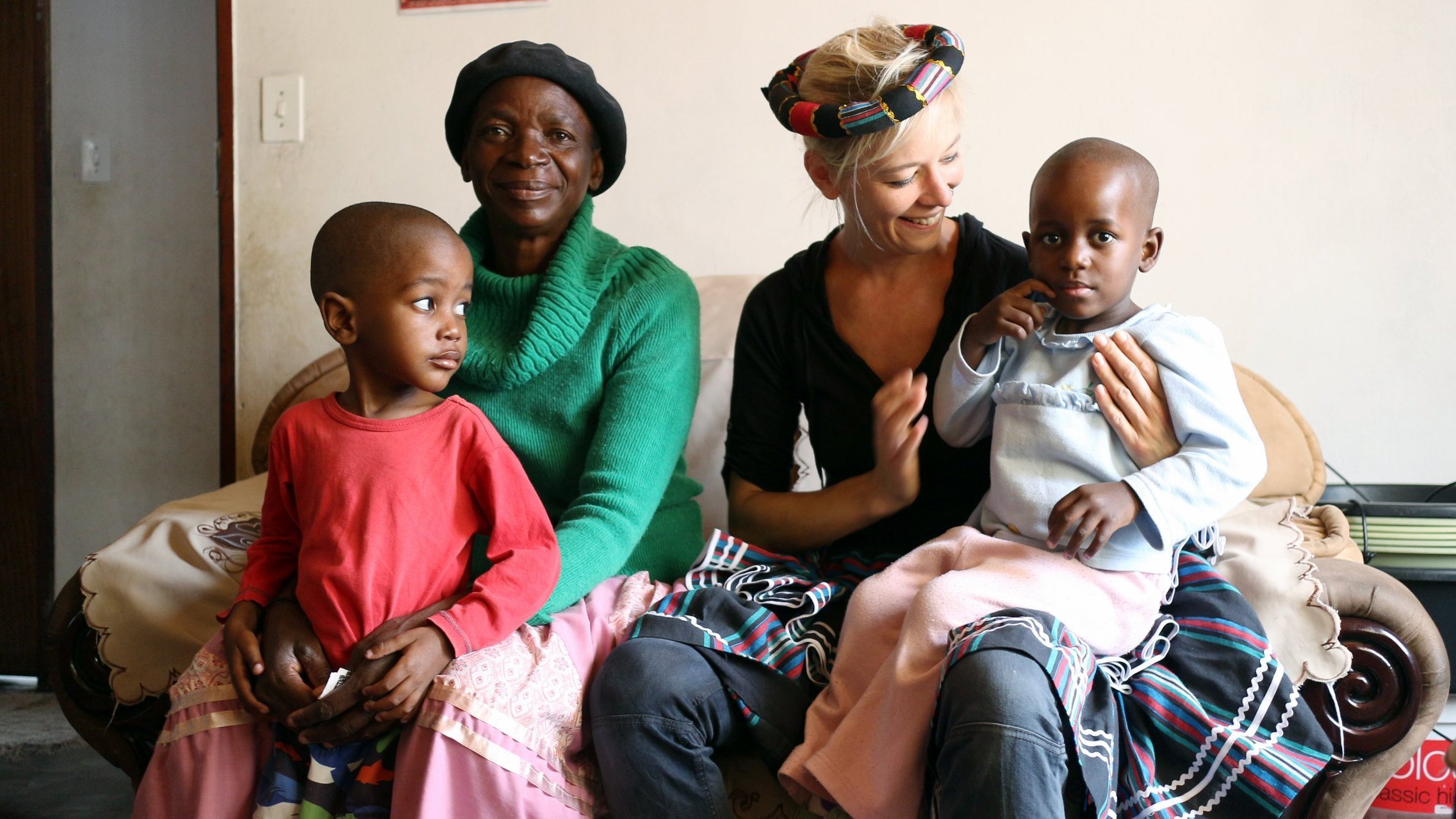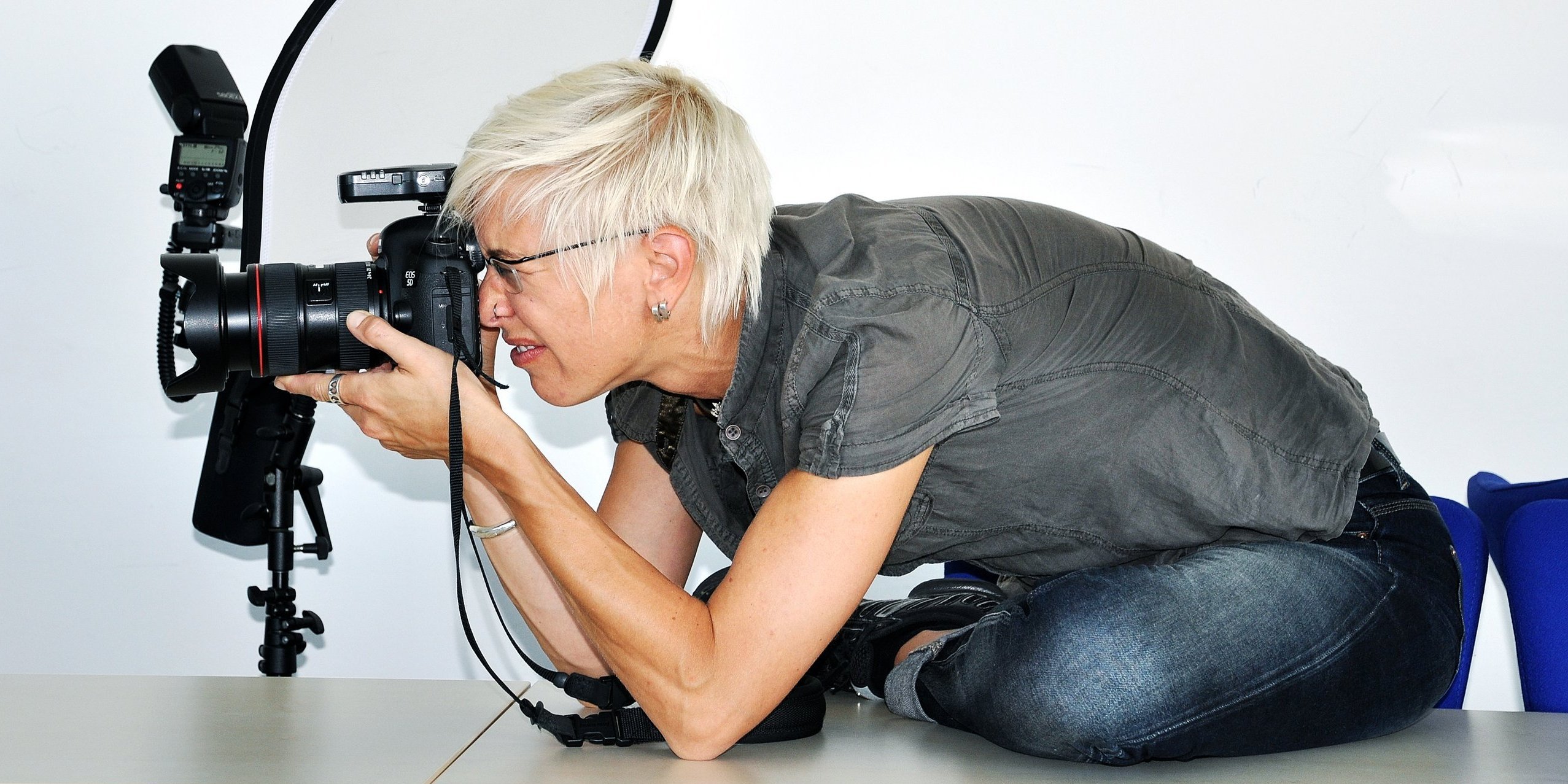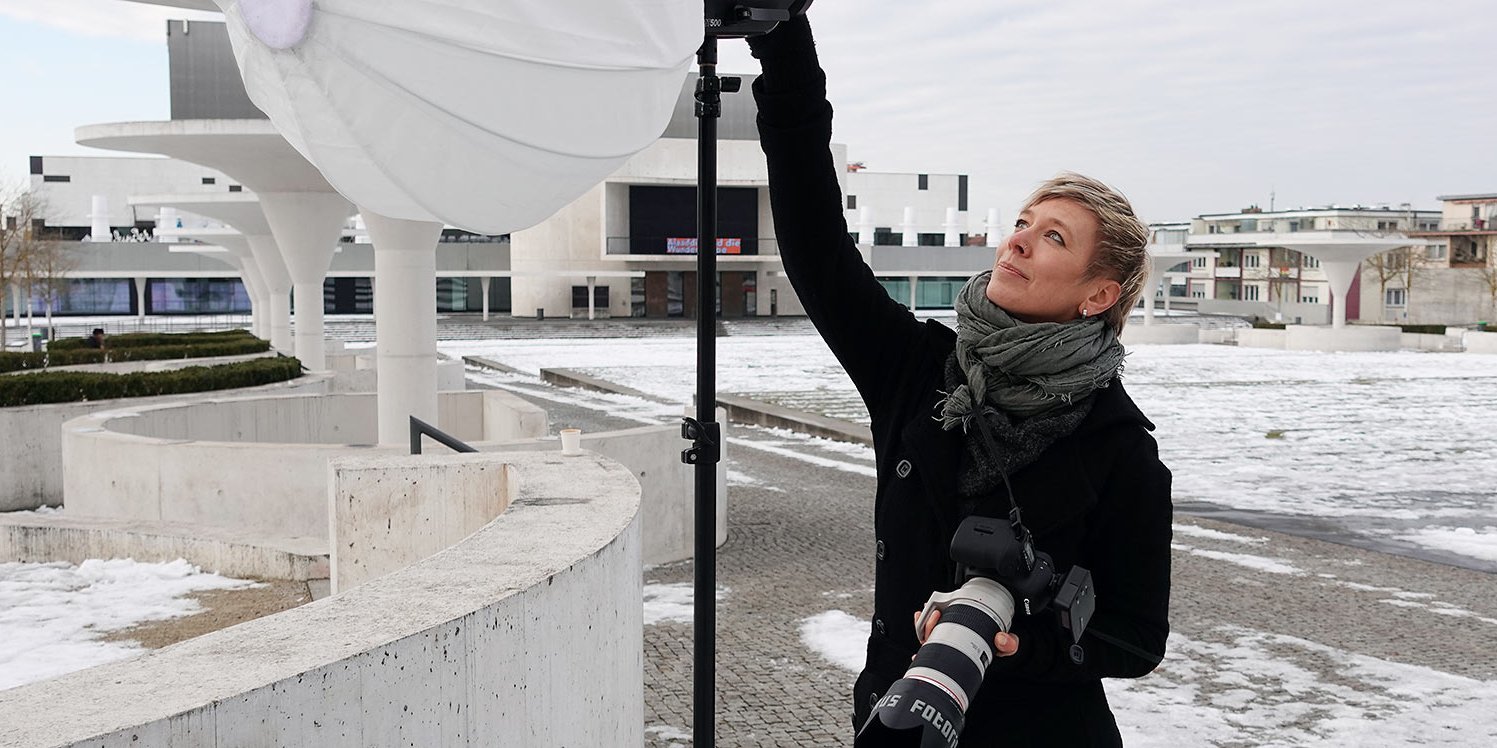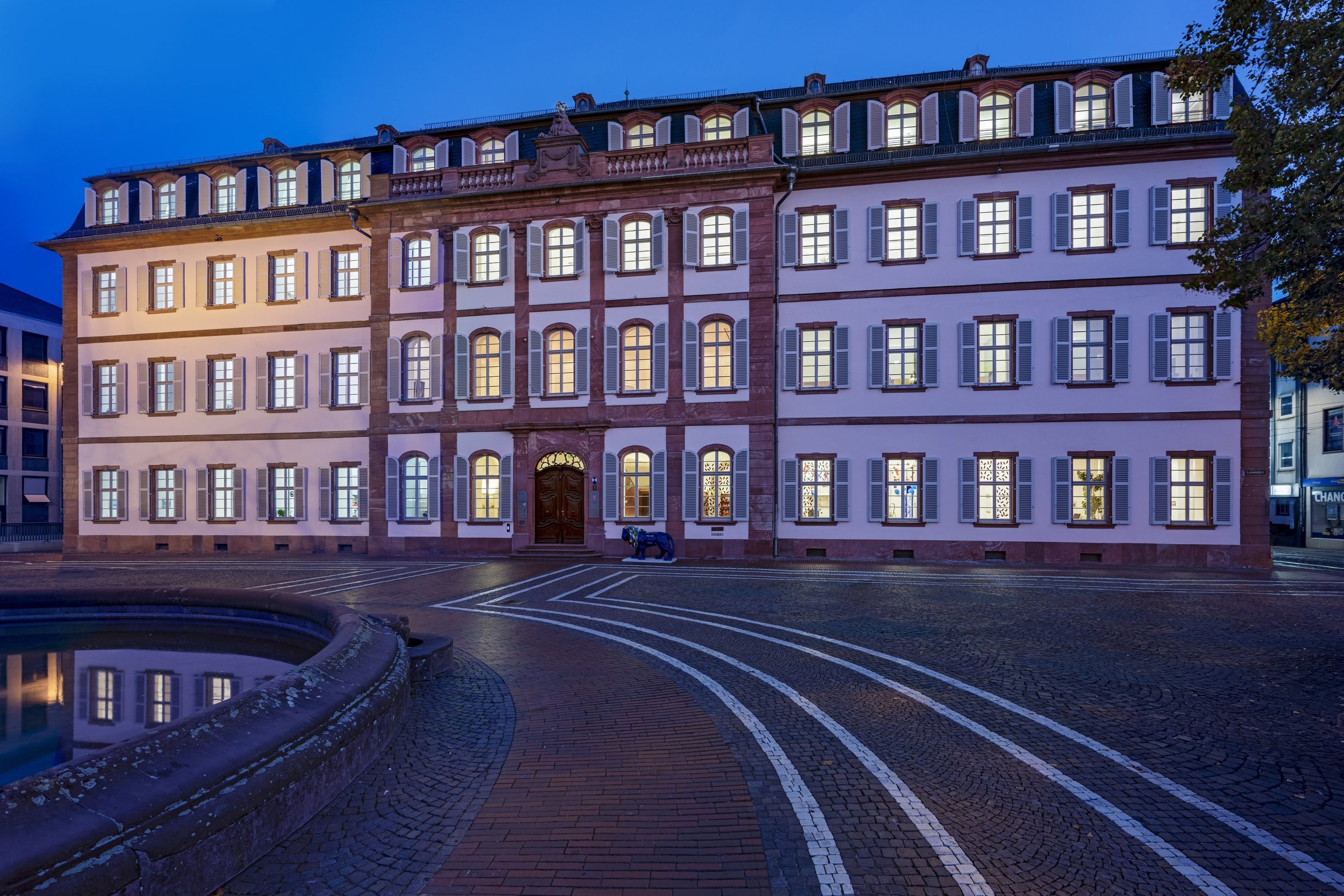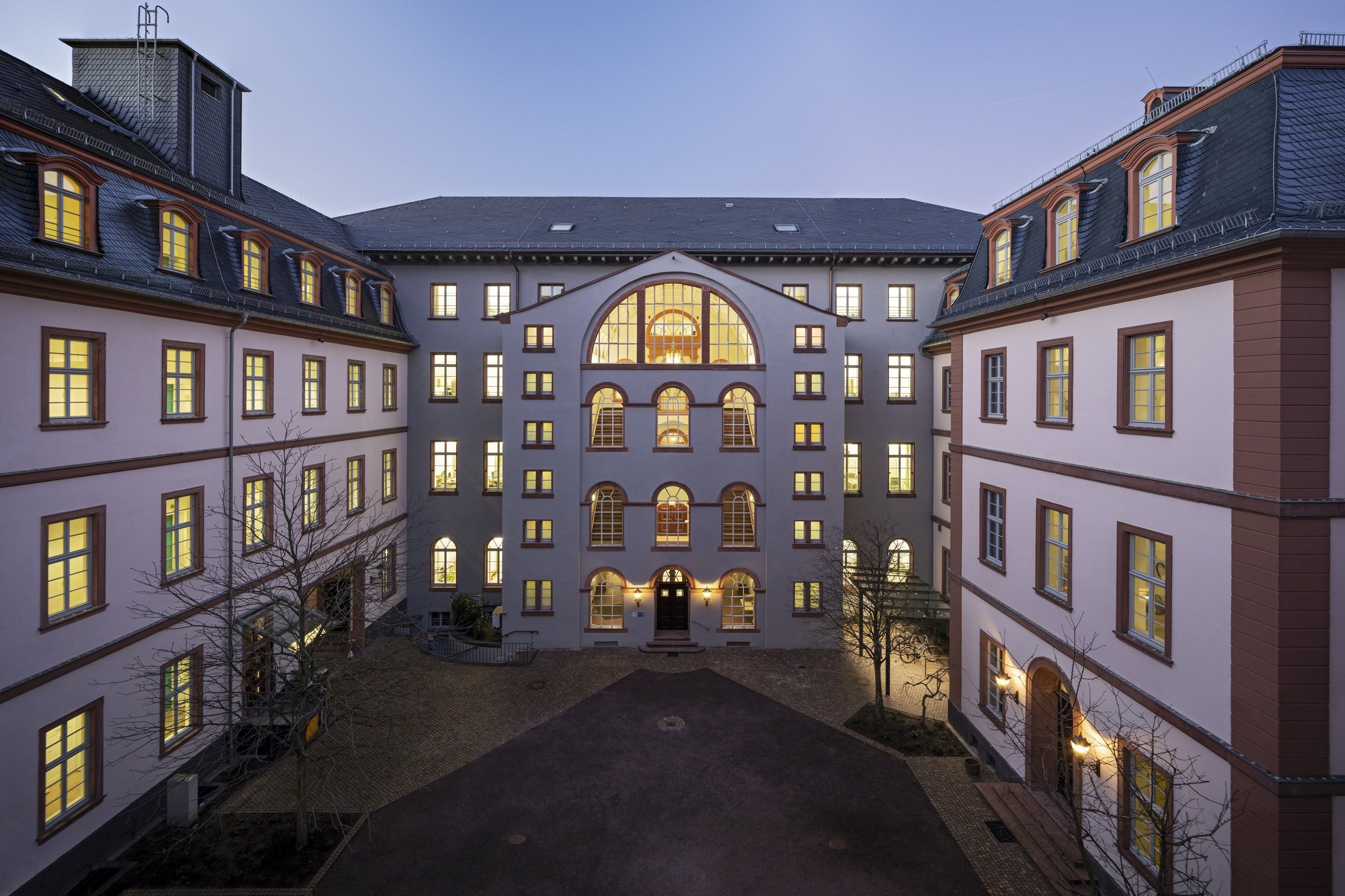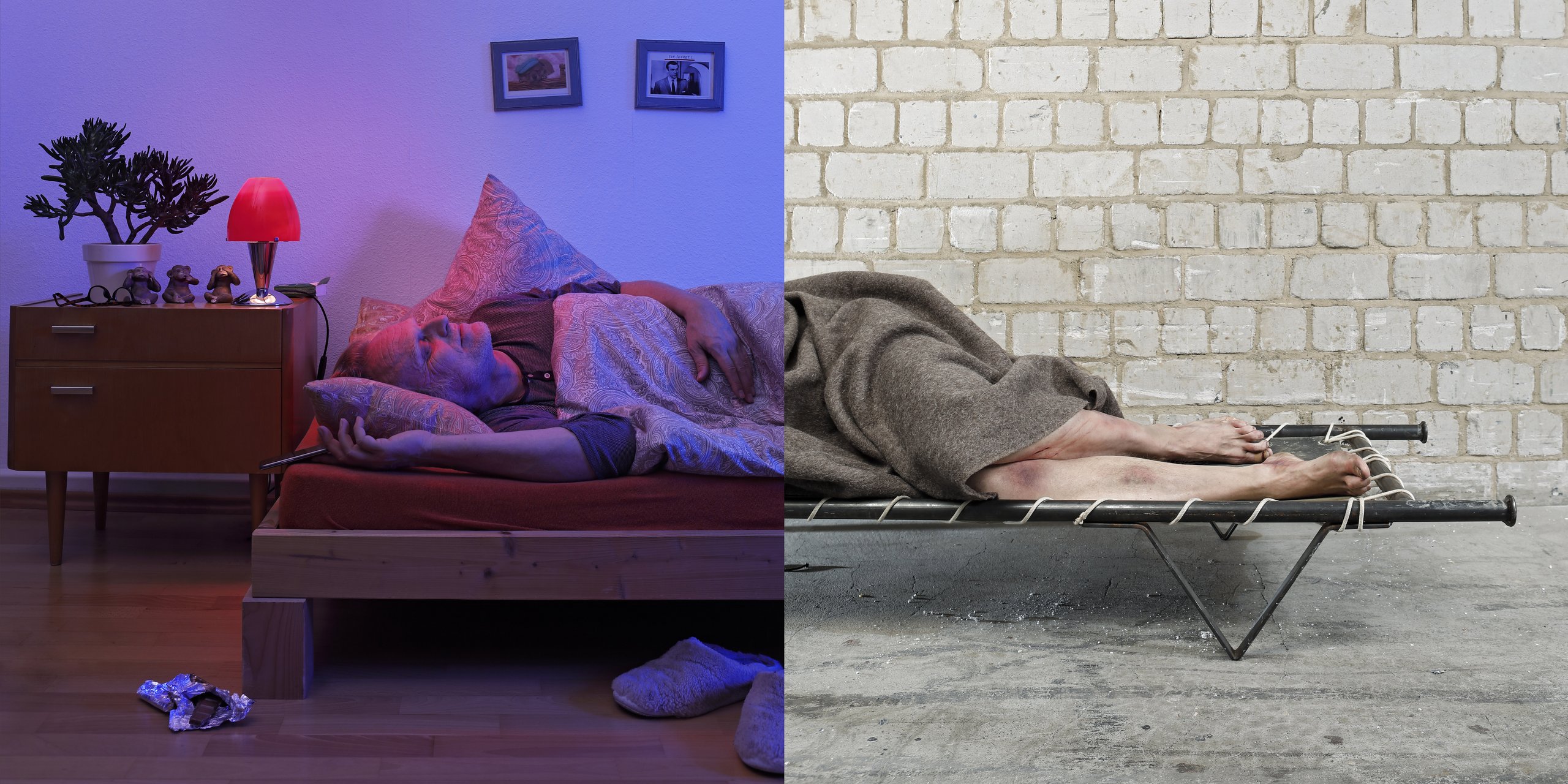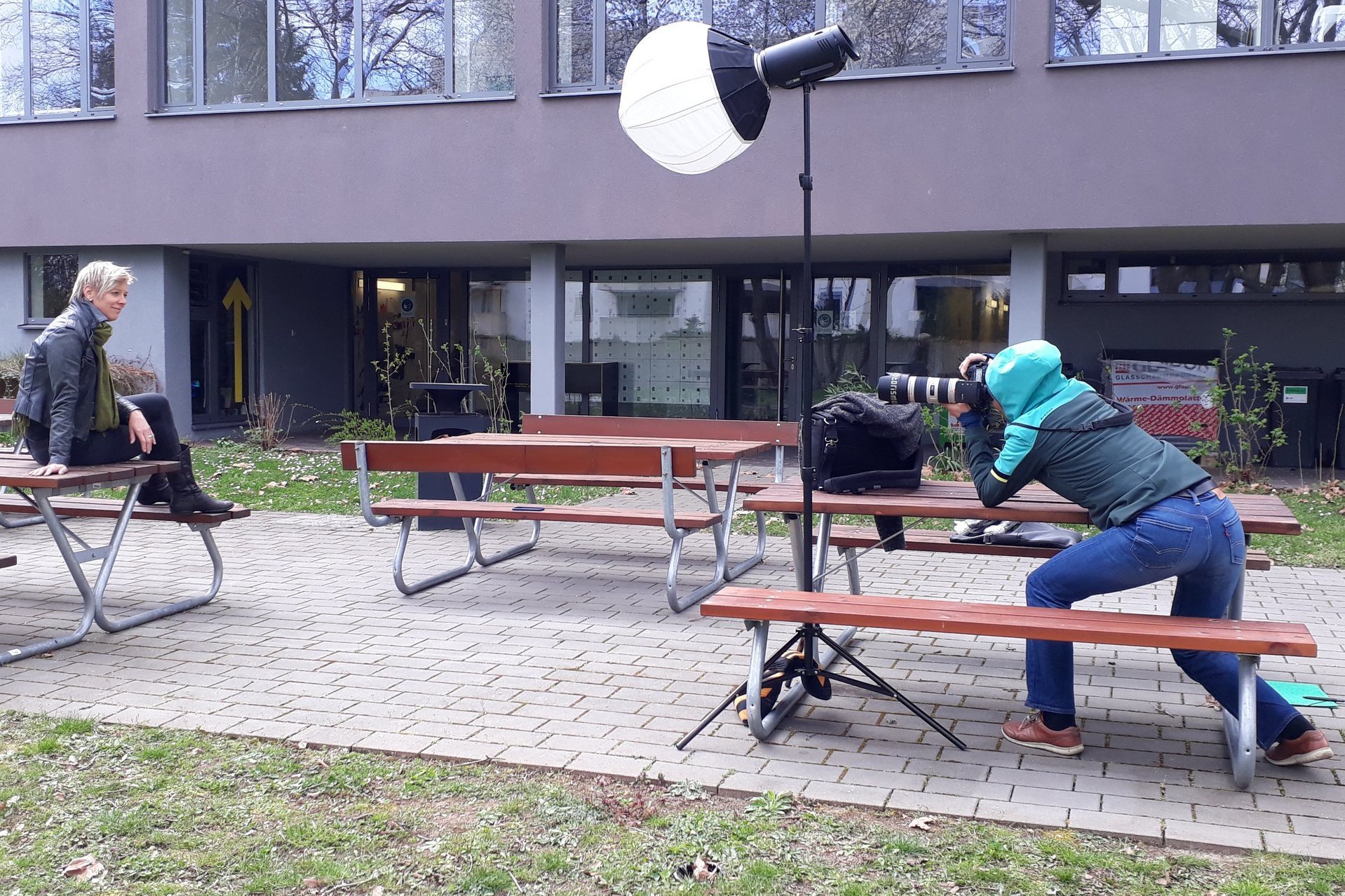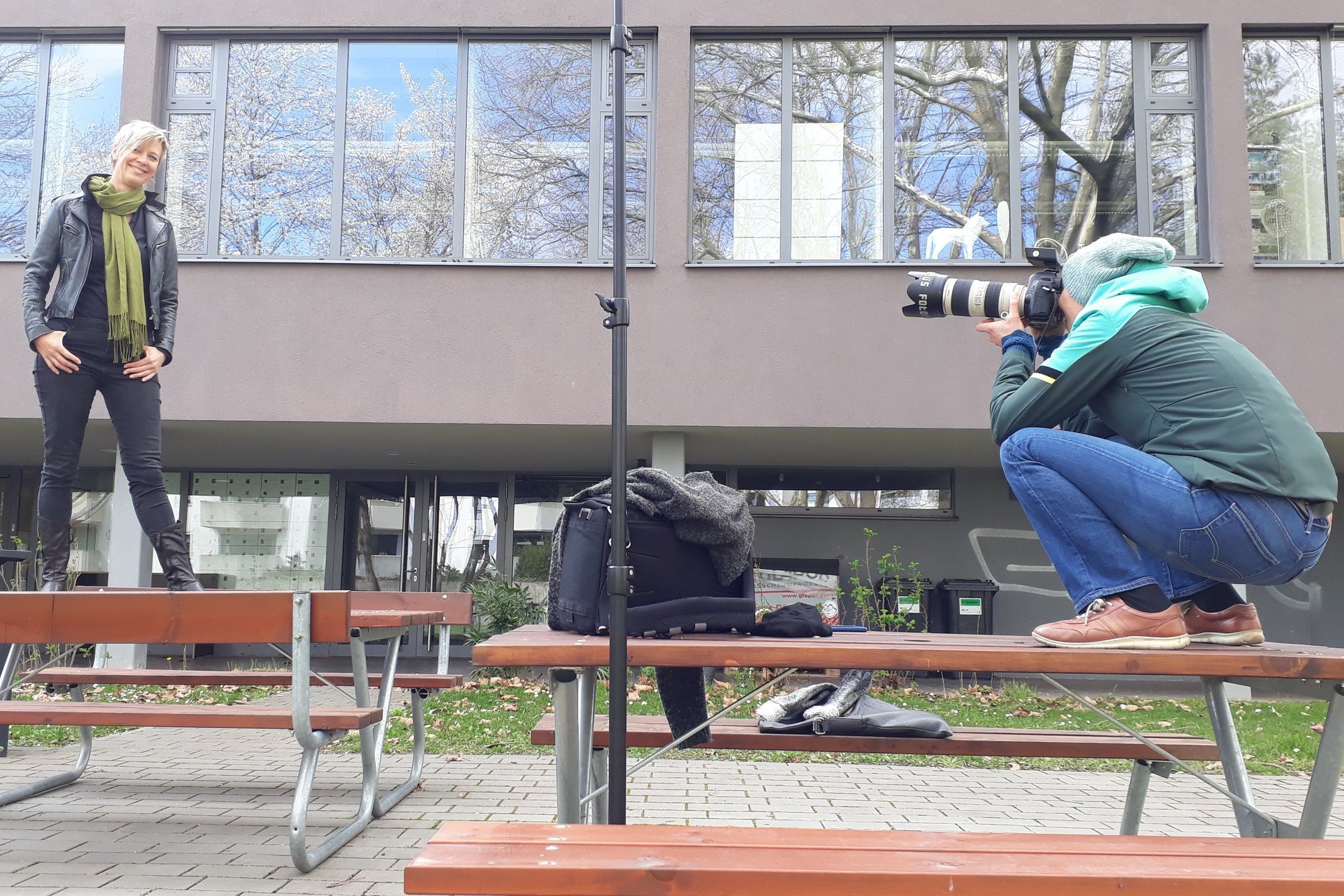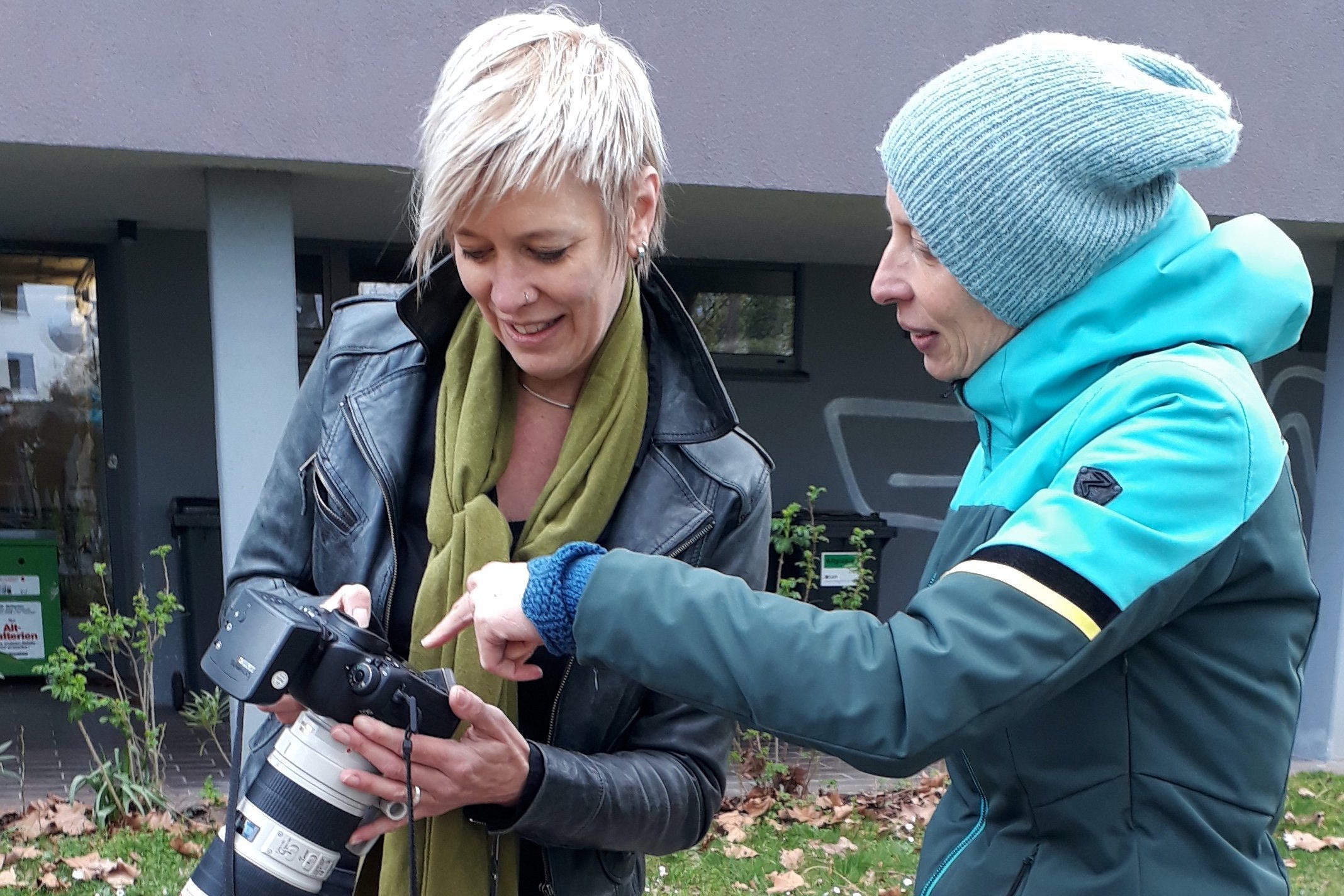“You should not glorify this profession“
Britta Hüning and Rahel Welsen (on the left) met in the early noughties during their studies of communication design at the Mathildenhöhe. Today, both work as freelance photographers, however, they have taken very different paths. In this interview, they talk about contract jobs and heartfelt projects, developments and decisions, exhibitions and lean spells.
Hello you two, so glad it worked out. Arranging for this meeting was not easy, because you are involved in several exhibitions, Rahel. Please tell us about it.
Rahel Welsen (RW): Yes, at the moment there are four exhibitions occurring in three months. In "Glatze zeigen" [Show your bald head] displayed until the end of May at the Haus am Dom in Frankfurt, I'm showing portrait photos of bald women. I asked them what life is like for a woman who no longer has hair. This is also a reflection on female ideals of beauty. Immediately before that, our annual “Unwort” [faux-pas word] exhibition ran in Darmstadt. Two other exhibitions are about architectural photography.
In the “Unwort” exhibition, you are one of nine Darmstadt photographers who visualize and interpret the "Unwort of the year”...
RW: Exactly. Between the announcement of the “Unwort” and the vernissage, there usually is only little time to discuss and implement our ideas. Then we have to organize and promote the exhibition - that is immensely exhausting indeed. But I'm glad to be part of the group.
How did it come about that you "show your bald head" yourself?
RW: Due to an autoimmune disease, my hair started to fall out in 2011.That was a sharp break. But I had three-quarters of a year to prepare for it. I quickly decided not to hide under a wig. For instance, with a wig I wouldn't have been able to do sports anymore which is essentially important to me. It was not so much a courageous decision, but rather the unwillingness to completely turn my life upside down. The fact that, due to my bald head, I was often stared at has made me more self-confident.
Britta Hüning (BH): I can only confirm that. Basically, you are a quiet person, in the past, however, you used to be more introverted and well-behaved. You didn't have the self-image and self-confidence you have today. I believe this thing pushed you right onto the stage of life. You were seen, whether you liked it or not. You have grown incredibly from that.
RW: Thank you, Britta. Today, I'm actually almost thankful for my bald head. Even if my hair grew back, I'd shave it off because I've grown to like my bald head so much. But I'm also glad when it's not about that topic for a change.
Well then, let's look back about 20 years. You met during your communication design studies, right?
RW: Actually, we only made closer contact after Britta had graduated. At that time, I did an internship with the photographer Britta shared the studio with. She had already found a job before me, I used to look up to her. And she always helped me to haul the incredibly heavy equipment up the stairs. (Both laugh)
What are your strongest memories from your student days?
BH: The great sense of community and the Mathildenhöhe! I felt honoured being admitted to study at this historic place with its tradition in design. At that time, across any degree programmes and semesters about half of all the students knew each other by name. There was a great readiness to help each other. During my studies I used to wear colourful dreadlocks, go to parties a lot and travel. I spent a semester abroad at Reading College in England and did an internship in South Africa. On the other hand, concerning the professional matter we got right in the middle of the transition from analogue to digital photography. All of a sudden, the former contents of teaching were outdated. That was difficult, lots of things had to be found anew. When I completed my apprenticeship in 1995, digital cameras did not even exist yet ...
RW: That's right, I never got to use the expensive medium-format camera I had bought especially. Digital photography meant a completely different way of working. Initially, I had studied free fine arts in Mainz. However, that was not for me. There, you were instantly regarded as an artist - but I still lacked the tools of the trade. That's why I switched to Darmstadt after my intermediate diploma. Learning the basics of design and photography wasn't easy. Today, however, I'm glad to be more broadly positioned as a graduate designer. Just the other day, I designed new business cards for myself again.
Britta, you talked about an apprenticeship ...?
BH: Yes, after graduating from high school I did a two-year apprenticeship as a photographer in Cologne. Following an internship, I went to South Africa for the first time. Then I also worked as a photo assistant, and only after that I took up my studies. For me, my studies then created the connection between craft and design I had been looking for. I'm benefiting from this again in my substitute professorship for photography and design at the h_da’s faculty of Media. This summer semester I'm going to teach a basic course of design there.
Graduation from high school in Leverkusen, apprenticeship to become a photographer in Cologne, internships at Bayer AG, photo assistant in a photo studio in Brühl near Cologne, among others. From 1997 on, studies of communication design at Darmstadt University of Applied Sciences, semester abroad at Reading College (England) and internship in Lulekani (South Africa). Since graduating in 2003, she has been working as a freelance photographer, among others for the media of Darmstadt University of Applied Sciences. In 2021/22 substitute professorship for photography at the h_da's faculty of Media. Lives with her partner and child near Darmstadt.
Rahel, you worked as an assistant for several years after graduating. Was that a good start?
RW: That was a great time. I was working with a photographer who did thriving business. We often had elaborate shootings - helicopter rides and the like. I have learned a lot from him and I'm very grateful for that time. Fortunately, when this phase came to an end, I had already acquired my own clients. So I was quite well prepared for standing in the front row myself.
Freelancer - that sounds great for now. But are you actually able to implement your creative ideas in your day-to-day business and to do the things you are interested in?
RW: I almost always enjoy my contract jobs in portrait and architectural photography, too. In any case, I don't have to put myself through anything just for the sake of making money.
BH: A lot has changed for me in 2016 when my son was born. Since then, most things you can do, but don't necessarily have to do will usually drop out of sight. Nevertheless, my work includes, in addition to the application-related contract jobs, still projects that are close to my heart. De facto, the two of them run together: The funky subjects are, after all, smaller jobs - and a business portrait usually requires quite a bit of creativity. I'm very happy that I can work in an artistic job offering freedom and lots of variety. Applied design is my thing. I don't even wonder if people perceive me as an artist when I work.
RW: That has actually developed differently for me. The artistic perspective, that's my life, that is just normal for me.
Born in South Baden, graduated from high school in Freiburg; studies of free fine arts at Gutenberg University in Mainz. After her intermediate diploma, she transferred to the h_da, where she studied communication design with a focus on photography. After graduating in 2005, she worked as a photo assistant on shootings, partly within international scope. Since 2010, independent photographer in Darmstadt with a focus on architecture and portrait photography. Regular exhibitions; since 2013 participation in the photographic visualisation of the annual "Unwort" selection.
What did the pandemic do to you and your work?
BH: In March 2020 I had a really good order situation - then things crashed. I managed to do well until summer, then there was zero orders. But as the day-care centre was closed and I had to look after my son, normal work was out of the question anyway. A scholarship of the Hessische Kulturstiftung [Hessian Cultural Foundation] saved me from the worst. In cooperation with an author, I portrayed and told the stories of women, who during the pandemic had a lot to accomplish, e. g. home office and home schooling, for the project "heartcor|e|ona". I enjoyed this a lot, of course. I was able to do what I love doing most: capturing people just as they are by taking portrait photos in their places. But I had to accept any support that was offered. The substitute professorship provides me with a good degree of security at the moment.
RW: During the lockdowns, scholarships and architectural photography kept me afloat. But for me, too, it was only possible by accepting support.
Do you consider photography to be your dream job?
RW: My income is volatile, which makes things a bit uncertain and often stressful. I wouldn't recommend my life to anyone. (Laughs) But, yes, I can't imagine anything else for myself. All in all, I feel completely comfortable in my job.
BH: It's a great job. Even if there is the occasional unpleasant task, overall I find it much diversified and therefore very enjoyable. But you shouldn't glorify it. It still means work and a lot of responsibility.
Author
Daniel Timme
Mai 2022

